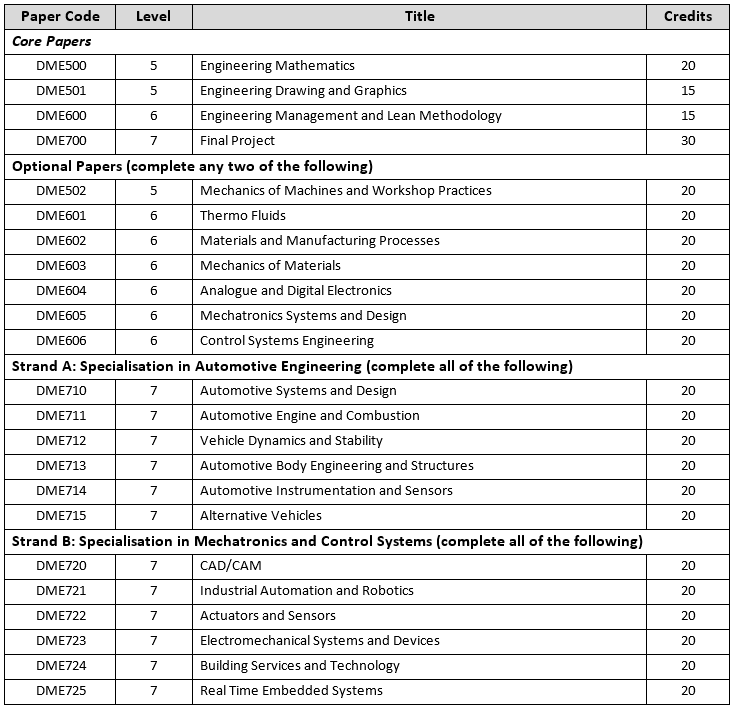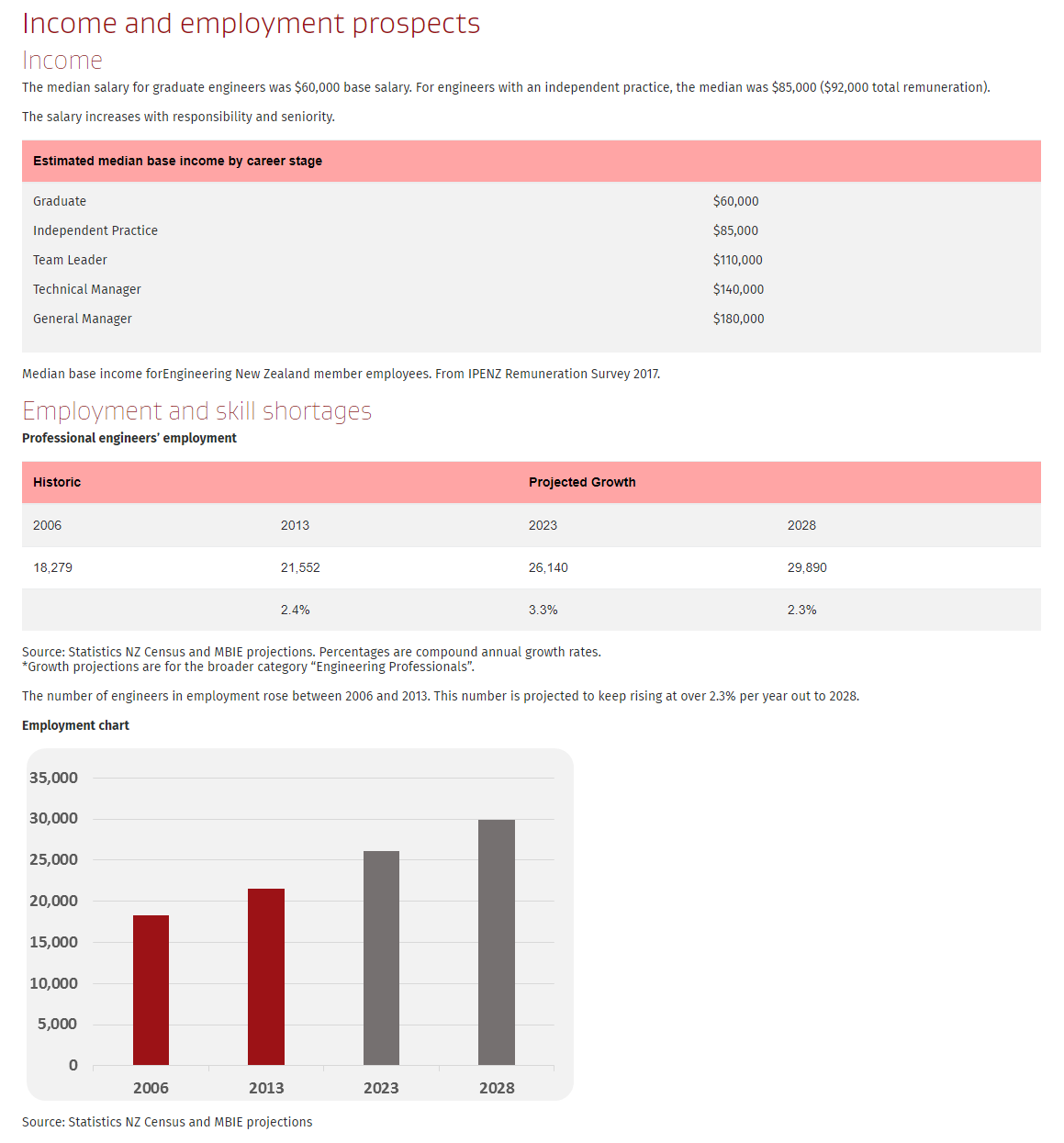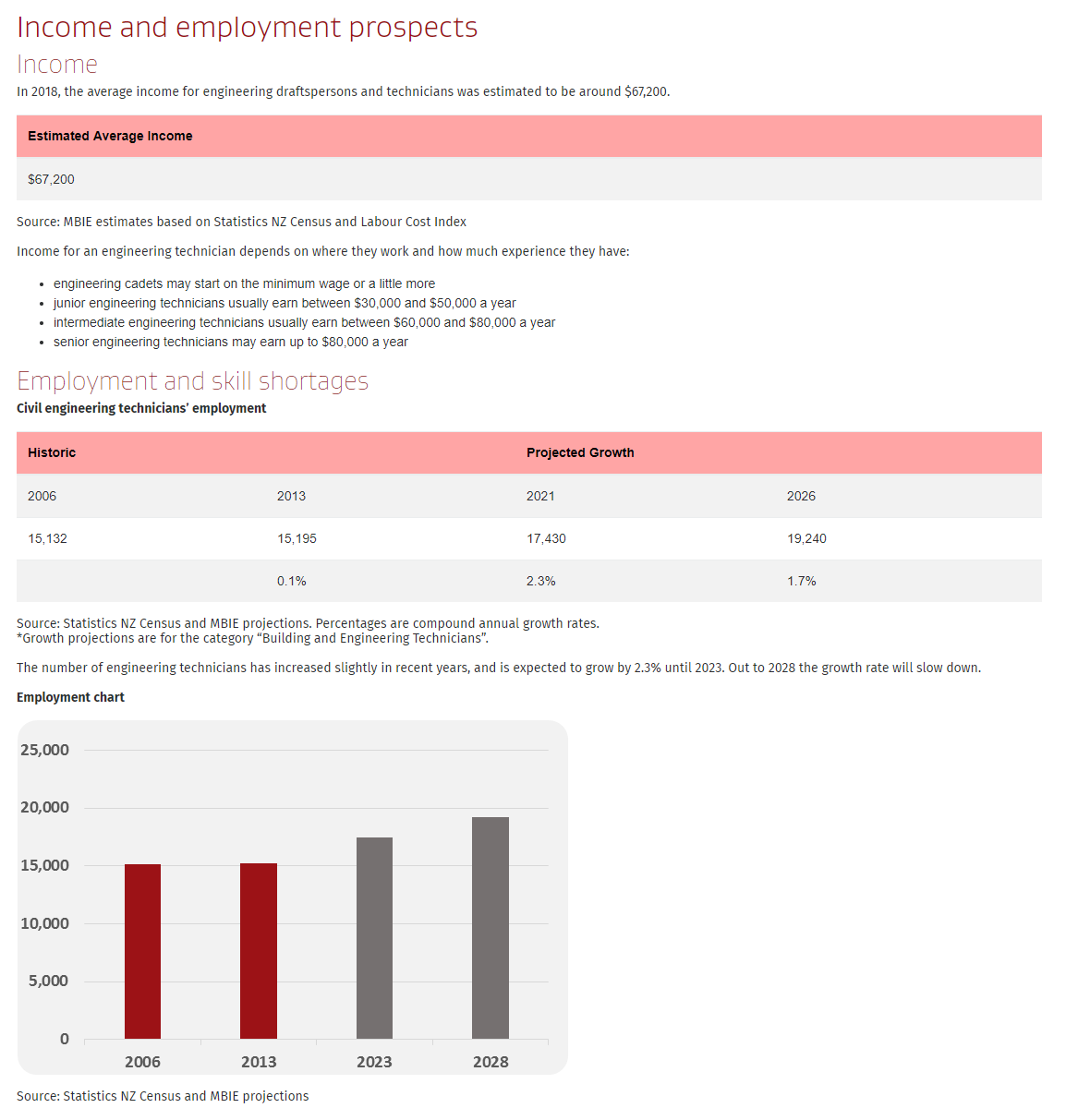Diploma in Mechanical Engineering (Level 7)
Explore advanced concepts in mechanical engineering
with our Level 7 Diploma program
Overview
1) Automotive Engineering,
2) Mechatronics and control
Course Details
Course Length
2 Academic Years ( Full Time )
Total credits
240
Entry Requirements
Applicants must have a Diploma in Mechanical Engineering – Level 5 or equivalent knowledge and skills. If English is not their first language, and for International students, an overall IELTS band score of at least 6.0 is required with no band score lower than 5.5, or evidence must be provided of equivalent English language proficiency.
You can use the English language tests in the table below to meet the ICA’s English language requirements. You must satisfy the requirements in one sitting, and results are valid for two years from the date on the test certificate.
English Language Requirements
You can use the English language tests in the table below to meet the ICA’s English language requirements. You must satisfy the requirements in one sitting and results are valid for two years from the date on the test certificate.
| Test | Minimum Requirements |
|---|---|
| IELTS (Academic) | Overall band score of 6.0 with no individual band score less than 5.5 |
| Internet-based TOEFL (iBT) | Score of 60 (with a writing score of 20) |
| Paper-based TOEFL | Score of 550 (with an essay score of 5 TWE) |
| Cambridge English: ESOL | FCE with a Pass at Grade B or CAE with a Score of 52 |
| NZCEL | Level 4 (Academic) |
| Pearson Test of English (Academic) | Overall band score of 50 with no individual band score less than 42 |
| City & Guilds IESOL | B2 Communicator with a Score of 66 |
Recognition of Prior Learning (RPL)
RPL addresses previous qualifications and relevant experience including:
- Cross credits
- Assessment of prior learning
- Credit transfers
Maximum 50% of cross credits may be awarded through RPL and APL. Credit transefrs can be done for all the subjects already passed.The student needs to apply for cross credits at the time of admission application. Once a course of study is approved, then it will not be considered for cross credits.
For More Information, please click here to download the brochure.
Aim of the Course
This programme aims to provide students with advanced theoretical knowledge, analytical and practical skills, and an in-depth understanding of technological principles, techniques and physical procedures required to work as Engineering technicians or technologists in the Mechanical Engineering industry including automotive, mechatronics and control. Graduates of this programme will work with various types of mechanical and electromechanical devices to provide solutions to mechanical engineering businesses and service industry needs.
Course Structure

Core Papers
DME500 Engineering Mathematics
This paper aims to develop theoretical knowledge and problem solving skills in learners by understanding and practising key concepts of different branches of mathematics, compulsory for engineers. The primary focus of this paper is to build learners’ capability to solve engineering problems using contemporary mathematical techniques. Upon completion, learner will be equipped with key concepts and tools of mathematics to solve complex engineering problems.
DME501 Engineering Drawing and Graphics
This paper aims to provide in-depth theoretical and practical understanding of drawing and drafting concepts. The primary focus of the paper is to develop learners’ ability in free hand sketching, drafting and computer drawing tools like AutoCAD. Upon completion of the course, the learner will be able to design and draft various machine components through manual drawing and computer software.
DME600 Engineering Management and Lean Methodology
This course intends to prepare the learners to apprehend management issues in the engineering projects and to tackle the problems raised in team work appropriate to contemporary engineering applications. Upon completion, the learners will have the required knowledge and skills to successfully manage and complete an engineering project.
DME700 Final Project
This paper aims to enhance problem solving skills, technical capabilities and the sense of social responsibilities of the learners by investigating, proposing, designing and testing a real life mechanical engineering project in accordance with current industry practices. The primary focus of the paper is to develop learners’ skills to research, propose, develop, test and troubleshoot a mechanical engineering project with suitable amount of supervision and mentoring facilities.
Optional Papers :
DME502 Mechanics of Machines and Workshop Practices
This course intends to provide an in-depth understanding of physics and workshop skills appropriate to contemporary engineering applications. The primary focus of the paper is on mechanics tools used in solving various structural problems in machine components. In addition to this, course also focuses on providing hands-on experience with workshop tools. Upon successful completion, the learners will be able to design various machine components and also use various workshop tools.
DME601 Thermo Fluids
This paper aims to develop an in-depth understanding of thermodynamics and fluid mechanics. The key focus of the paper includes concepts of heat flow in various mechanical systems including power generation and processing industries. In addition, the fundamentals of fluid mechanics, which are used in various fluid transferring devices, are also discussed. Upon completion of the paper, the learners will be able to design and analyse various thermodynamic system and devices used in power generation, HVAC and manufacturing industry.
DME602 Materials and Manufacturing Processes
This paper aims to provide an in-depth theoretical and practical understanding of materials used in engineering; and their conventional and advanced manufacturing processes. The primary focus of the paper is to develop learners’ ability to understand material according to design and manufacturing requirements and select an appropriate sequence of manufacturing processes.
DME603 Mechanics of Materials
This paper aims to provide an in-depth theoretical and practical understanding of mechanics of materials. The primary focus of the paper is to develop the learners’ abilities to understand various mechanical structures, perform mechanical analysis in their design and test various loading conditions in accordance with industry practices
DME604 Analogue and Digital Electronics
The paper aims to develop an understanding of analogue and digital electronics with an emphasis on circuit analysis, measurements, design and use of equipment. The paper covers DC and AC circuit theory and concepts of combinational and sequential logic circuits. Upon completion, the learner should be able to construct, interface and troubleshoot analogue and digital circuits using suitable techniques, equipment and software tools.
DME605 Mechatronics Systems and Design
This paper aims to develop fundamental knowledge of contemporary engineering systems that include integrated mechanical and electronic systems. The paper covers analysis and design of electro-mechanical systems; design and working principles of different automated heat generation units, processing, automotive and manufacturing industries. Upon completion, the learner will be able to understand and analyse various automatic systems, processing and assembly lines.
DME606 Control Systems Engineering
This course aims to develop a strong understanding of control systems and their mathematical representation in the time, frequency and state space domains, electrical and mechanical control system stability analysis and designs techniques. The primary focus of the course is to develop skills in learners to analyse, design, simulate and implement control systems for real life applications.
Strand A: Automotive Engineering
DME710 Automotive Systems and Design
This paper aims to provide in-depth theoretical and practical understanding of automotive systems. The primary focus of the paper is to develop learner’s ability to understand overall automotive systems and their design. Upon completion, the learner will be capable of designing various automotive components using CAD software.
DME711 Automotive Engine and Combustion
This paper aims to provide in-depth theoretical and practical understanding of automotive engines and their combustion mechanism. The primary focus of the paper is to develop learner’s ability to understand engine construction and design, diagnose its problem and implement automotive knowledge to rectify various issues in the engine and its combustion system
DME712 Vehicle Dynamics and Stability
This paper aims to develop leaner’s capability in designing of vehicle forces, generated due to movement of various components and their self-weight. The primary focus of the paper is to understand vehicle stability laws, dynamics of loads and active involvement of suspension system in providing comfort to passengers. Upon completion of the paper, the learner will be able to solve automotive dynamic forces problems using contemporary mechanics techniques.
DME713 Automotive Body Engineering and Structures
The paper aims to develop in-depth knowledge of chassis design and different cosmetic and structural panels installed in vehicle bodies. The primary focus of the paper is the classification and design of
automotive structures including the body, chassis and supportive components that are used in vehicles structures. Upon completion of the paper, the learners will be able to analyse and design automotive body structures, frames and chassis.
This paper aims to develop in-depth understanding of instrumentation and measurement components involved in vehicles. The primary focus of the paper is on various instrumentation systems and devices used in automotive applications that control vehicle engine, fuel, brake and suspension systems. Upon completion of the paper, the learner will be able to propose computer controller and instrument based solutions to automotive industry, test and diagnose vehicle problems and tune electronic systems installed in vehicles.
This paper aims to provide an in-depth theoretical and practical understanding of alternative vehicles and transmission system. The primary focus of the paper is to develop learners’ ability to understand hybrid vehicles including solar, electric and biofuels driven vehicles. In addition, this course will also enhance learners’ understanding of automotive transmission and drives. Upon completion, learner will be able to review and analyse functionality and principles of alternative vehicles and automatic transmission and drives.
This paper aims to develop leaner’s understanding and skills of advanced machine design and computerized manufacturing in product development industry. The key focus of the paper is to develop leaner’s knowledge and skills in the use of contemporary software tools that include CAD and CAM based solutions. Upon completion of the paper, the learner will be able to design products on CAD software and also be able to generate their CNC code, workable on CNC machines.
The aim of this paper is to develop learners’ knowledge and skill of automation and robotics use in industrial applications in accordance with current industry practices. The key focus of the paper is to acquaint and train leaners with applications of automation and robotics to propose and implement contemporary automated mechanical systems as well as to upgrade conventional systems in accordance with industry practices. Upon completion of the paper, learner will be able to propose and apply automation and robotics technology for new and already operated conventional mechanical and manufacturing systems.
This paper aims to give in-depth theoretical and practical understanding of actuators and sensors for mechatronic designs. The paper includes topics on time, frequency, measurements, sensor and actuator fundamental characteristics, physical relationships and mathematical models associated with the sensor and actuator technologies. Upon completion, learner will be able formulate mathematical models; design sensors and actuators; and select appropriate sensors and actuators with appropriate specifications as a part of engineering solution to a complex problem.
This paper aims to develop in-depth theoretical and practical understanding of electromechanical systems and devices. The paper covers electromechanical systems analysis and design concepts and techniques, DC electric machines and motion devices, induction and synchronous machines and control of electromechanical systems. Upon completion, learner will be able to propose and develop engineering solutions based on electromechanical systems and devices.
This paper aims to develop in-depth theoretical and practical understanding of electrical and mechanical design processes used in today’s buildings. The focus of the papers is to acquaint learners with understanding of equipment, design, testing and installation of HVAC, plumbing systems, electrical lighting systems, signal systems and building automation systems. Upon completion, learner will be able to propose equipment, design and supervise maintenance of electrical and mechanical systems of buildings.
This paper aims to provide in-depth knowledge and skills appropriate to today’s embedded systems, in both hardware and software development. The primary focus of the paper is to make the learner a competent and independent practitioner in the field of embedded systems to a level whereby learner has knowledge and skills necessary to gain entry into a professional practice of the embedded system industry.
DME714 Automotive Instrumentation and Sensors
This paper aims to develop in-depth understanding of instrumentation and measurement components involved in vehicles. The primary focus of the paper is on various instrumentation systems and devices used in automotive applications that control vehicle engine, fuel, brake and suspension systems. Upon completion of the paper, the learner will be able to propose computer controller and instrument based solutions to automotive industry, test and diagnose vehicle problems and tune electronic systems installed in vehicles.
DME715 Alternative Vehicles
This paper aims to provide an in-depth theoretical and practical understanding of alternative vehicles and transmission system. The primary focus of the paper is to develop learners’ ability to understand hybrid vehicles including solar, electric and biofuels driven vehicles. In addition, this course will also enhance learners’ understanding of automotive transmission and drives. Upon completion, learner will be able to review and analyse functionality and principles of alternative vehicles and automatic transmission and drives.
Strand B: Mechatronics and Control Systems
DME720 CAD/CAM
This paper aims to develop leaner’s understanding and skills of advanced machine design and computerized manufacturing in product development industry. The key focus of the paper is to develop leaner’s knowledge and skills in the use of contemporary software tools that include CAD and CAM based solutions. Upon completion of the paper, the learner will be able to design products on CAD software and also be able to generate their CNC code, workable on CNC machines.
DME721 Industrial Automation and Robotics
The aim of this paper is to develop learners’ knowledge and skill of automation and robotics use in industrial applications in accordance with current industry practices. The key focus of the paper is to acquaint and train leaners with applications of automation and robotics to propose and implement contemporary automated mechanical systems as well as to upgrade conventional systems in accordance with industry practices. Upon completion of the paper, learner will be able to propose and apply automation and robotics technology for new and already operated conventional mechanical and manufacturing systems.
DME722 Actuators and Sensors
This paper aims to give in-depth theoretical and practical understanding of actuators and sensors for mechatronic designs. The paper includes topics on time, frequency, measurements, sensor and actuator fundamental characteristics, physical relationships and mathematical models associated with the sensor and actuator technologies. Upon completion, learner will be able formulate mathematical models; design sensors and actuators; and select appropriate sensors and actuators with appropriate specifications as a part of engineering solution to a complex problem.
DME723 Electromechanical Systems and Devices
This paper aims to develop in-depth theoretical and practical understanding of electromechanical systems and devices. The paper covers electromechanical systems analysis and design concepts and techniques, DC electric machines and motion devices, induction and synchronous machines and control of electromechanical systems. Upon completion, learner will be able to propose and develop engineering solutions based on electromechanical systems and devices.
DME724 Building Services and Technology
This paper aims to develop in-depth theoretical and practical understanding of electrical and mechanical design processes used in today’s buildings. The focus of the papers is to acquaint learners with understanding of equipment, design, testing and installation of HVAC, plumbing systems, electrical lighting systems, signal systems and building automation systems. Upon completion, learner will be able to propose equipment, design and supervise maintenance of electrical and mechanical systems of buildings.
DME725 Real Time Embedded Systems
This paper aims to provide in-depth knowledge and skills appropriate to today’s embedded systems, in both hardware and software development. The primary focus of the paper is to make the learner a competent and independent practitioner in the field of embedded systems to a level whereby learner has knowledge and skills necessary to gain entry into a professional practice of the embedded system industry.
Option for Cross Credit
Appendix 1:
The following eight options are available for achieving the version one maximum of six prescriptions (120 credits) by cross credit/APL:
Specified credit transfer from other qualifications
|
Option 1: |
6 Papers (120 cr) |
|
Option 2: |
5 Papers (100 cr) |
|
Option 3: |
4 Papers (80 cr) |
|
Option 4: |
3 Papers (60 cr) |
|
Option 5: |
2 Papers (40 cr) |
|
Option 6: |
1 Paper (20 cr) |
Appendix 2:
Policy: Cross Credits for six months
Policy for six months credits
- Secondary School Certificate+ Higher (Superior) Secondly School certificate + 3 Years diploma in mechanical or relevant OR
- Secondary School Certificate+ 3 Years diploma in mechanical or relevant with following options
Appendix 3:
Policy: Cross Credits for 12 months
Policy for 12 months cross credits talks about
- Applicants who must have completed their bachelor or BTec qualification and want to study advanced courses in accordance with New Zealand market need. There is no particular requirements of grade for cross credit.
Career Opportunities
- Mechanical Engineer (ANZSCO Number: 233512)
- Mechanical Engineering Draftsperson (ANZSCO Number: 312511)
- Mechanical Engineering Technician (ANZSCO Number: 312512)
- Mechanic’s Assistant (ANZSCO Number: 899916)
- Metallurgical or Materials Technician (ANZSCO Number: 312912)
- Motor Mechanic (General) (ANZSCO Number: 321211)
- CAD Design Technician
- Hydraulic Controls Technician
- Mechatronics and Control Process Engineer
- Industrial Engineer (ANZSCO Number: 233511)
- Materials Engineer (ANZSCO Number: 233112)
- Machine Operators nec (ANZSCO Number: 711999)
- Diesel Motor Mechanic (ANZSCO Number: 321212)
- Engineering Production Systems Worker (ANZSCO Number: 712311)
- Plastics Production Machine Operator (General) (ANZSCO Number: 711514)
- Plastics Technician (ANZSCO Number: 399916)
- Production or Plant Engineer (ANZSCO Number: 233513)
- Rubber Production Machine Operator (ANZSCO Number: 711516)
- Air conditioning and Refrigeration Mechanic (ANZSCO Number: 342111)
- Air conditioning and Mechanical Services Plumber (ANZSCO Number: 334112)
- HVAC Engineer and Technician
- Aircraft Maintenance Engineer (Mechanical) (Aircraft Mechanical Background) (ANZSCO Number: 323112)
Income and Employment Prospects
For Engineering Professionals:

For Engineering Technicians:

Program Brochure
Download our program brochure to learn more about our courses and offerings.
